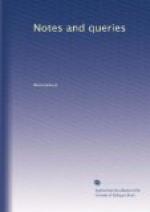“Particular of names
of the several persons within the same
lordship under the sum of
5l., to pole for according to the
acts of parliament.”
Can any of your correspondents inform me to what tax the above lists applied, and what were the acts of parliament under which this tax (or pole-money) was payable.
T.N.I.
Wakefield.
Welsh Money.—I have never seen in any work on coins the slightest allusion to the money of the native princes of Wales before the subjugation of their country by Edward I. Is any such in existence? and, if not, how is its disappearance to be accounted for? I read that Athelstan imposed on the Welsh an annual tribute in money, which was paid for many years. Query, In what sort of coin?
J.C. Witton.
A skeleton in every House.—Can you or any of your correspondents explain the origin of that most significant saying “There is a skeleton in every house?” Does it originate in some ghastly legend?
Mors.
[Our correspondent is right in his conjecture. The saying is derived from an Italian story, which is translated in the Italian Tales of Humour, Gallantry, and Romance, published some few years ago, with illustrations by Cruikshank.]
Whetstone of Reproof.—Can any of your readers inform me who was the author of the book with the following title?
“The Whetstone of Reproofe, or a Reproving Censvre of the misintitled Safe Way: declaring it by Discourie of the Authors fraudulent Proceeding, and captious Cauilling, to be a miere By-way, drawing pore Trauellers out of the royalle and common Streete, and leading them deceitfully into a Path of Perdition. With a Postscript of Advertisements, especially touching the Homilie and Epistles attributed to Alfric: and a compendious Retortiue Discussion of the misapplyed By-way. Avthor T.T. Sacristan and Catholike Romanist.—Catvapoli, apud viduam Marci Wyonis. Anno MDCXXXII.” Sm. 8vo. pp. xvi. 570. 198.
It is an answer to Sir Humphrey Lynd’s Via Tuta and Via Devia. In Wood’s Ath. Oxon., edit. Bliss, fol. ii. col. 602, two answers to the Via Tuta are mentioned; but this is not noticed. From the author stating in the preface, “I confesse, Sir Humfrey, I am Tom Teltruth, who cannot flatter or dissemble,” I suppose the initials T.T. to be fictitious.
John I. Dredge.
Morganatic Marriages.—Morganatique.—What is the derivation of this word, and what its actual signification?
In the Dictionnaire de l’Academie Francaise (ed. 4to., 1835), the word does not appear. In Boister’s Dictionnaire Universel (Bruxelles, 1835) it is thus given:—
“Morganatique, adj.
2 g., nocturne, mysterieux, entrainee par
seduction; (mariage) mariage
secret des princes d’Allemagne avec
une personne d’un rang
inferieur.”




